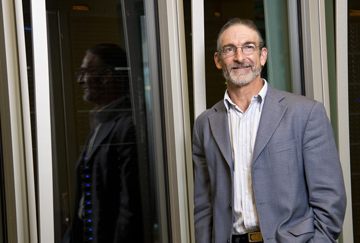Green Week profile: Gary Burniske
October 24, 2013
 |
|
Gary Burniske, managing director of the Center for Global Food Security. (Purdue University photo/Steven Yang) |
The Center for Global Food Security is Purdue's vanguard unit for fighting global hunger and advocating for sustainable food.
As Green Week heads into its fourth day, activities and organizations that focus on sustainable food are in the spotlight. Here, Gary Burniske, managing director of the Center for Global Food Security, talks about the center's ongoing efforts.
What is the Center for Global Food Security?
The center was founded in 2011 by Gebisa Ejeta, Distinguished Professor of Agronomy. He is also the center's director and the 2009 Word Food Prize laureate. The center's mission is to take up global challenges to food security so we can help ensure that the world has enough food for the 21st century and beyond.
What are your duties at the center?
I'm responsible for the center's day-to-day operations, which vary depend on the activities we have in progress. Right now, we're involved in several activities.
One is the U.S. Borlaug Fellows Program, which we run through a five-year, $5 million grant from the U.S. Agency for International Development.
The program includes a two-week summer institute, which we hold on campus for domestic and international graduate students enrolled in U.S. universities. Out of dozens of applications, we select about 35 students to attend. During the institute, faculty and scientists from Purdue, other universities and international research institutions present lectures, panels, practicums and group projects related to food security. Topics include grand challenges facing food security such as climate change, population increase, nutrition concerns and post-harvest management.
The second part of the Borlaug program allows us to offer around 15 scholarships in the fall and 15 in the spring to U.S. citizens studying at domestic graduate schools. Scholarship recipients must undertake research on issues related to food security in the developing world. Scholarships range from $15,000 to $40,000 for six months to a two-year period and cover travel, research and related expenses. Right now, we have 45 scholarship winners studying issues in places scattered across sub-Saharan Africa, Latin America and South/Southeast Asia.
What other activities is the center pursuing?
Right now, the center is involved in a joint project with Indiana University, whose researchers are studying the negative effect of food insecurity on HIV-affected communities in Africa. Because we know poor diet can keep these the retroviral drugs from being effective, Purdue's researchers -- through an initiative called Leading with Knowledge -- are determining policies and practical actions that could help increase those communities' access to nutritious food.
The center is also involved in a program called Integrated Striga Management. Through it, Purdue researchers are working with researchers in Ethiopia and Tanzania to help farmers with small farms adopt technology that improves sorghum production. The technology involves the use of improved varieties of sorghum seed that are more resistant to drought and striga -- commonly called witchweed in the U.S. This program builds on Dr. Ejeta's research, and it is funded by a four-year, $5 million grant from the Bill & Melinda Gates Foundation.
What other job duties do you have?
I spend a lot of time visiting various classes on campus and giving presentations about food security. I also work with faculty members to develop proposals for new initiatives related to food security. As you can probably tell, I'm passionate about this challenge -- I spent 35 years working for nongovernmental organizations in developing countries on issues related to food security. It's a challenge everyone should know about and consider.
Why is it important to raise awareness about food security, particularly among students?
At the center, we want Purdue students to understand that food security affects everyone in every country. Once they understand that, we want to spur students to action -- everything from being conscious of their own food's nutrition to supporting sustainable gardening to understanding food systems and supporting civic groups.
We want students to understand that, as future leaders, there are some significant food challenges they will have to resolve. Their generation will be responsible for making sure there's enough food to meet everyone's needs, here in Indiana and beyond.
Writer: Amanda Hamon, 49-61325, ahamon@purdue.edu
